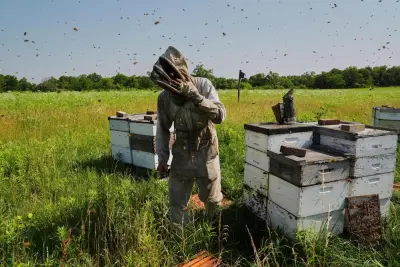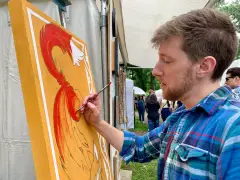Bees have some ways to cope with a warming Earth, but researchers fear for their future

By JOSHUA A BICKEL ISABELLA O MALLEY and JENNIFER McDERMOTT WILLIAMSPORT Ohio AP Sweat covers Isaac Barnes s face under his beekeeper s veil as he hauls boxes of honeycomb from his hives to his truck It s a workout in what feels like a sauna as the late-morning June temperatures rise Related Articles Keeping animals of all sizes from cats to horses cool during record heat Steve Miller Band says extreme weather is so dangerous it s canceling its tour Trump s tariff pressure pushes Asia toward American LNG but at the cost of atmosphere goals Can artificial reefs in Lake Michigan slow erosion and boost fish population Researchers aim to find out Grand Canyon blaze shows how managing a fire can go suddenly sideways Though Barnes was hot his bees were even hotter Their body temperatures can be up to degrees Fahrenheit higher than the air around them As global temperatures rise under circumstances change scientists are trying to better understand the effects on managed and wild bees as they pollinate crops gather nectar make honey and reproduce They noticed flying bees gathering nectar avoided overheating on the hottest days by using fewer but harder wingbeats to keep their body temperature below dangerous levels according to a assessment published last year Scientists also say that bees like people may also cope by retreating to a cooler conditions such as the shade or their nest Just like we go into the shade or we sweat or we might work less hard bees genuinely do the exact same thing so they can avoid the heat reported Jon Harrison an environmental physiologist at Arizona State University and one of the analysis s authors But that means the bees aren t able to do what they normally do stated Kevin McCluney a biology professor at Bowling Green State University They re not going out and getting more nectar They re not mating They re not doing the things that bees would otherwise do McCluney reported Heat is just one challenge for critical pollinator Generally the bulk bees are heat-tolerant but as the setting warms selected experts think their ability to fend off disorder and gather food might become harder And habitat loss increased use of pesticides diseases and lack of forage for both managed and wild bees are all listed as likely contributors to the global decline of bees and other pollinators A honeybee feeds on blue sage Tuesday June at Black Swamp Preserve in Bowling Green Ohio AP Photo Joshua A Bickel If you re not well-fed and your body is intoxicated with pesticides and you have lots of diseases in your body you re going to be less heat-tolerant than if you were healthy reported Margarita L pez-Uribe a pollinator wellness expert at Pennsylvania State University Earlier this year preliminary results from the annual U S Beekeeping Survey uncovered that beekeepers lost almost of their managed colonies the highest loss since the survey started in Almost all of the managed honeybee colonies in the U S are used to pollinate agricultural crops such as almonds apples cherries and blueberries Fewer pollinators can lead to less pollination and potentially lower yields It s a very fragile system if you think about it L pez-Uribe explained Because if something goes wrong you have these super high-value crops that won t get enough bees for pollination Losing hives at Honeyrun Farms Back at Barnes hives in Ohio thousands of honeybees fly around as he gathers boxes to take back to his farm for honey production Nearby a couple of his bees land on milkweed flowers a rare bit of plant diversity in an area dominated by corn and soybean fields For Barnes who operates Honeyrun Farm with his wife Jayne one of the challenges heat can pose to his honeybee hives is fending off parasitic mites that threaten the bees If temperatures get too hot he can t apply formic acid an organic chemical that kills the mites If it s applied when it s too hot the bees could die Last year they lost almost a third of the hives they sent to California to help pollinate commercial almond groves Barnes thinks those hives may have been in poor soundness ahead of pollination because they were unable to ward off mites when it was hot months earlier Dead hives aren t pollinating the almonds he explained It s a real ripple effect that stems back from the heat in the summertime Isaac Barnes inspects a honeycomb from one of his honeybee hives Tuesday June in Williamsport Ohio AP Photo Joshua A Bickel Sometimes the heat helps Here in Ohio Barnes hives last summer produced a bumper crop of honey as they feasted on nearby soybean nectar as the plants bloomed in the heat Still the lack of diverse plants for bees to forage in an area dominated by corn and soybean fields isn t ideal And even the native blooms are appearing erratically Barnes noted In autumn his bees search for food on goldenrod but those blooms are appearing later And even then he has supplemented his hive with additional food to keep them healthy into the winter Every single plant that blooms is something that the bee can use Barnes explained And every single plant is affected by situation change Research that may aid bees is in peril It s only in the last decade that people have become aware of the magnitude of the pollinator decline globally mentioned Harrison of Arizona State University Facts is limited on how much environment change and heat stress is contributing to pollinator decline It s a relatively new focus for biology he reported I think it s super central but it s not being studied a ton The Trump administration s proposed budget would eliminate the research scheme that funds the USGS Bee Lab which supports the inventory monitoring and natural history of the nation s wild bees Other grants for bee research are also in jeopardy Honeybees gather on the outside of their hive Tuesday June in Williamsport Ohio AP Photo Joshua A Bickel Beekeeping suits hang next to an outdoor thermometer Tuesday June at Honeyrun Farm in Williamsport Ohio AP Photo Joshua A Bickel Isaac Barnes places a full honeycomb onto the back of his truck Tuesday June in Williamsport Ohio AP Photo Joshua A Bickel Isaac Barnes takes a drink of water after harvesting honeycomb from his honeybee hives Tuesday June in Williamsport Ohio AP Photo Joshua A Bickel An employee scrapes raw honey off of a honeycomb while working Tuesday June at Honeyrun Farm in Williamsport Ohio AP Photo Joshua A Bickel A bee-shaped sticker sits on a truck window Tuesday June in Williamsport Ohio AP Photo Joshua A Bickel Kevin McCluney a biology professor looks for bees to collect Tuesday June at Bowling Green State University in Bowling Green Ohio AP Photo Joshua A Bickel Reese Jackson holds a leafcutter bee inside of a collection vial Tuesday June at Bowling Greene State University in Bowling Green Ohio AP Photo Joshua A Bickel Reese Jackson places a sample used to measure the hydration levels in bees in a tray Tuesday June at Bowling Green State University in Bowling Green Ohio AP Photo Joshua A Bickel Reese Jackson draws a sample used to measure the hydration level in bees Tuesday June at Bowling Green State University in Bowling Green Ohio AP Photo Joshua A Bickel Show Caption of Honeybees gather on the outside of their hive Tuesday June in Williamsport Ohio AP Photo Joshua A Bickel Expand U S Sen Jeff Merkley of Oregon noted America s pollinators are in grave danger and he ll fight for the federal funding Pollinators contribute to the robustness of the planet the crops we grow and the food we eat he disclosed Rather than taking bold action to protect them the Trump administration has proposed a reckless budget that would zero out funding for critical research aimed at saving vital pollinators he declared in a declaration to The Associated Press Harrison revealed his research on this topic would come to a halt if cuts are made to his federal funding and it would be more arduous in general for scientists to evaluation the disappearance of bees and other pollinators and improve how they prevent these losses Not being able to manage these pollinator deaths could cause the price of fruits vegetables nuts coffee and chocolate to jump or become scarce Hopefully even if such research is defunded in the U S such research will continue in Europe and China preventing these extreme scenarios revealed Harrison The Associated Press weather and environmental coverage receives financial assistance from multiple private foundations AP is solely responsible for all content Find AP s standards for working with philanthropies a list of supporters and funded coverage areas at AP org


